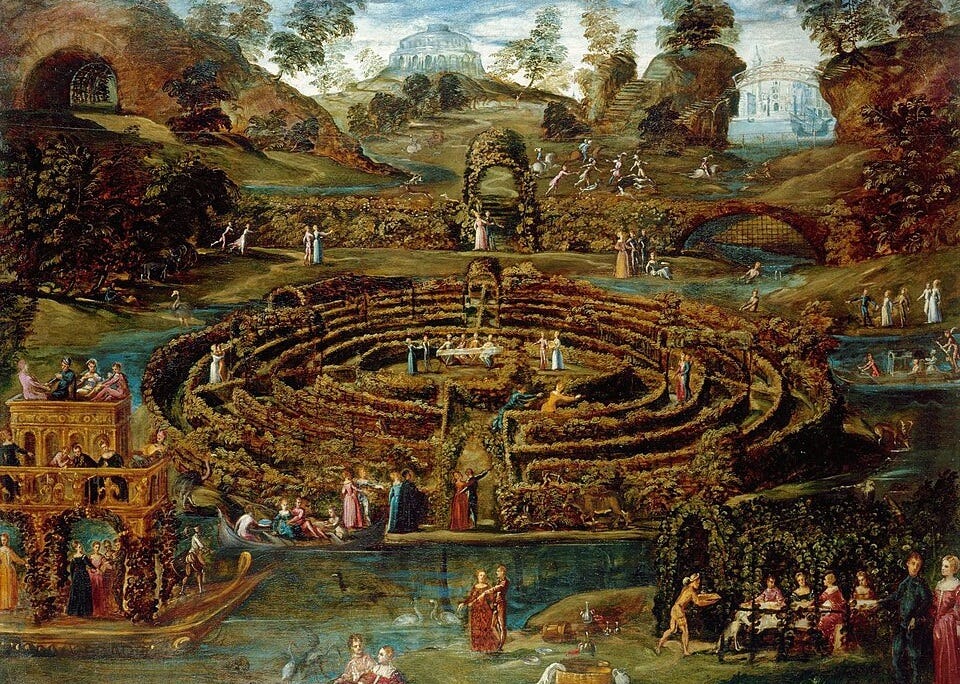So what does your setting mean?
Only what significance you put in it.
You can not put anything into your story and assume it will carry its meaning without any effort or rhetoric on your part, and your setting is no different.
Granted, some settings are easier to load with symbolic significance than others, and certain kinds of symbolic significance are easier to load onto some settings that others
.
Most settings have some meanings they can not bear, such as using a labyrinth as a symbol of simplicity.
Many settings have cultural usages that may vary, and which may make one symbolic use more or less easy. For instance, in the Middle Ages, the labyrinth was a symbol of skilled, masterful creation -- the original was, after all, created by that mastermind Daedalus, and was so good it nearly baffled Daedalus himself -- and consequently also a symbol of the world. (Theologians, arguing for God's masterful creation, pointed at ant hills, beehives, and spider webs as intricate labyrinths.)
Nowadays, it would take considerably more rhetorical efforts to make it a symbol of the world. Probably would have to have many way stations in it that were symbolically places of the world.
Skilled, masterful creation you would need to emphasize, heavily. Perhaps only by having characters who recognize the effort and knowledge that went into it, and who talk about the creation and even use it as a metaphor for their work might work.
Both of those tend to be viewed from above. Nowadays, it could also represent mathematics, if its pattern is carefully geometrically arranged. Or the path can be chosen in pattern.
A labyrinth can, rather more easily, represent a difficult journey. It can be inextricable, and the difficulty in getting out is always bad, indicating a prison. It can be impenetrable, and that is usually bad, indicating what is inside is imprisoned, but it can be used as a symbol of how valuable it is. The difficulty can simply be a test of whether the character is worthy of it.
So powerful is that as a symbol that you can easily ladle it onto another setting: a city's intricate streets, a large and complex building, a forest difficult to navigate, can all be identified as labyrinthine.
Other symbolic settings can likewise be freighted. A garden can be a symbol of nature, but it can also be a symbol of settlement, in contrast to wild nature. ("Garden" comes from the same root as the Russian "grad" -- city.) The simplest form of dealing with this is how enclosed it is. A walled garden is very much opposed to wild nature. Fences, and how sturdy they are, also cut it off. Whether you put weeds in the garden, or show people weeding, also weighs in on the significance of the separation from nature.
The type of garden also matters very much. Obviously a kitchen garden, a herb garden, and a flower garden all differ.
The first can be be laden with as much food significance as a kitchen or bakery, though of course raw vegetables and perhaps fruits.
The herb garden takes in several aspects. It provides food like a kitchen garden. It is generally richly scented, making it beautiful in a way that is less popular nowadays. (Not so much in, say, medieval days. Modern roses, for instance, are not bred for scent the way medieval ones were.) And, of course, particularly in fantasy, herbs often have uses beyond food. Perhaps they are planted in a knot garden for magical reinforcement or protection of their virtues.
Flower gardens can be scented as well. Also filled with beautiful blossoms and thus a symbol of beauty. Love poetry is filled with gardens for good reason.
On its own, a knot garden, or still more a hedge maze, opens the door to all the labyrinth symbolism. (Especially the knot garden, easily viewed from above.) These, and any form of formal garden, push toward the "settlement" symbolism.
An English country garden, or other gardens where the flowers are allowed to spread naturally, points more toward nature.
One can, of course, also use its wild/settled contrast to make it a liminal region, passing between the regions where humans live and the regions where other things live. A meeting place for man and beast, or perhaps man and fae.
But neither of these settings have any of those meanings, nor do any other settings have any meaning, unless you put it into them.




